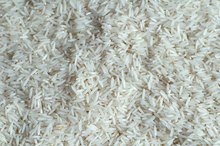Do All Fruits & Vegetables Have Fructose?
Fructose is a natural simple sugar found in varying quantities in all fruits, fruit juices and vegetables. For many people, even a small amount of fructose may cause malabsorption, or intestinal discomfort. Fresh or fresh frozen fruits and vegetables may be better tolerated than processed canned food to eliminate gas, bloating, abdominal cramping and diarrhea that can be caused by high levels of fructose.
Fruits
Foods with the highest fructose content that may cause intestinal problems include prunes, pears, cherries, peaches, apples, plums, applesauce, apple juice, pear juice, apple cider, grapes and dates. Easily digested fruits that have a minimal effect on the digestive tract are pineapples, strawberries, raspberries, blackberries, lemons, limes, avocado, bananas, rhubarb and oranges, according to the University of Virginia Health System.
Vegetables
Is Sorbitol Dangerous for Children?
Learn More
Heat causes loss of fructose so cooked vegetables may be tolerated better than raw. Foods with fructose include asparagus, cauliflower, green peppers, broccoli, leafy greens, celery, mushrooms, cucumber, beans and root vegetables. Tomatoes, corn, carrot and sweet potatoes contain the most fructose, according to the University of Virginia Health System.
Fructose Intolerance
Thirty percent of people have fructose malabsorption, a sugar sensitivity caused by the inability of the small intestine to break down or absorb sugars, according to Food Intol, a website devoted to food intolerance. Fructose sensitivities can cause sugar cravings, mood disturbances and depression. Fructose malabsorption inhibits the absorption of nutrients, which can lead to long-term effects such as anemia, unhealthy skin and hair, and osteoporosis. Hereditary fructose intolerance is a rare genetic condition that lasts for life, according to Food Intol. It creates an inability in the body to produce enzymes for breaking down fructose. Without a restricted fructose-free diet, there is risk of serious diseases including liver failure.
- Thirty percent of people have fructose malabsorption, a sugar sensitivity caused by the inability of the small intestine to break down or absorb sugars, according to Food Intol, a website devoted to food intolerance.
Health
Fructose-Free Diet
Learn More
According to a report in the Journal of Nutrition, high fructose consumption may increase risk of gout and kidney stones. Excessive fructose may raise triglycerides, so large fructose intake is not recommended. A study by the Department of Medicine at the University of Minnesota found that fructose in fruits and vegetables should not be a concern to diabetics in modest consumption. Dr, John P. Bantle, professor of Medicine, Endocrinology and Diabetes division at the University of Minnesota, said fructose occurring naturally in fruits and vegetables is a component of energy intake and, although large amounts of fructose are undesirable, these healthy foods should be included in the diet for diabetics.
- According to a report in the Journal of Nutrition, high fructose consumption may increase risk of gout and kidney stones.
- A study by the Department of Medicine at the University of Minnesota found that fructose in fruits and vegetables should not be a concern to diabetics in modest consumption.
Weight Gain
Fructose in excessive amounts can induce leptin resistance, which could contribute to weight gain when combined with a high-at, high-calorie diet. A six-month study at the University of Florida College of Medicine in Gainesville and published in the American Journal of Physiology, used two groups of rats and found that a high-fructose diet produced higher blood levels of triglycerides. Rats on the no-fructose diet responded normally to leptin by eating less.
Related Articles
References
- University of Virginia Health System: Low Fructose Diet
- Journal of Nutrition: Dietary Fructose and Metabolic Syndrome and Diabetes
- Health Central: The Fructose Puzzle
- Science Daily: Fructose Sets Table For Weight Gain Without Warning
- Biesiekierski JR. Fructose-induced symptoms beyond malabsorption in FGID. United European Gastroenterol J. 2014;2(1):10-3. doi:10.1177/2050640613510905
- Fedewa A, Rao SS. Dietary fructose intolerance, fructan intolerance and FODMAPs. Curr Gastroenterol Rep. 2014;16(1):370. doi:10.1007/s11894-013-0370-0
- National Institutes of Health. Hereditary fructose intolerance. Updated February 11, 2020.
- Mann NS, Cheung EC. Fructose-induced breath hydrogen in patients with fruit intolerance. J Clin Gastroenterol. 2008;42(2):157-9. doi:10.1097/01.mcg.0000225667.53673.02
- Choi Y, Kraft N, Zimmerman B, Jackson M, Rao S. Fructose Intolerance in IBS and Utility of Fructose-Restricted Diet. J Clin Gastroenterol. 2008 Mar;42(3):233-8. doi:10.1097/MCG.0b013e31802cbc2f
- Ebert K, Witt H. Fructose malabsorption. Mol Cell Pediatr. 2016 Dec;3:10. doi: 10.1186/s40348-016-0035-9
- Yao CK, Tuck CJ. The clinical value of breath hydrogen testing. J Gastroenterol Hepatol. 2017;32 Suppl 1:20-22. doi:10.1111/jgh.13689
- Jung KW, Seo M, Cho YH, et al. Prevalence of fructose malabsorption in patients with irritable bowel syndrome after excluding small intestinal bacterial overgrowth. J Neurogastroenterol Motil. 2018;24(2):307-316. doi:10.5056/jnm17044
- Fedewa A, Rao SS. Dietary fructose intolerance, fructan intolerance and FODMAPs. Curr Gastroenterol Rep. 2014;16(1):370. doi:10.1007/s11894-013-0370-0
- Johns Hopkins Medicine. (n.d.). Gastroenterology and Hepatology: Breath Testing.
Writer Bio
Gord Kerr's professional background is primarily in business and management consulting. In 1991, Kerr started writing freelance for a small local newspaper, "The Summerland Review," and a leading sailing publication, "Cruising World Magazine." Kerr has a Bachelor of Business Administration degree from Wilfred Laurier University.









